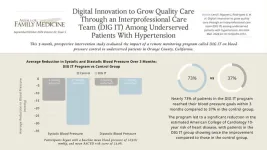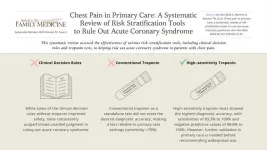(Press-News.org) Giving women at risk of premature birth a simple magnesium sulphate infusion (or ‘drip’) can prevent their babies from developing cerebral palsy, a recent Cochrane review has confirmed. The drug itself costs approximately £5 (~$6.50) per dose in England, and requires hospital admission with experienced staff to administer the drug safely to the mother. A new editorial calls for this intervention to be implemented more widely and equitably, as it is still not consistently available worldwide.
The first Cochrane review showing that magnesium sulphate protects premature babies against cerebral palsy was published in 2009, and the recent update includes newer trials which further confirm this finding. It has been recommended by the World Health Organization since 2015 for women at risk of premature birth before 32 weeks of gestation, but implementation remains a challenge in many areas.
Knowing which interventions are effective is only part of the battle, as implementing them consistently across complex health systems is far from trivial. After seeing the results of the original review, neonatologist Karen Luyt was inspired to ensure this life-changing intervention was offered to all eligible mothers across England. This includes all women going into labour before 30 weeks of gestation, and some women between 30 and 33 weeks depending on clinical factors.
“Preterm birth is the leading cause of brain injury and cerebral palsy with lifelong impact on children and families,” says Karen Luyt, Professor in Neonatal Medicine at the University of Bristol. “When the Cochrane meta-analysis was published in 2009, I realised that magnesium sulphate, given to mothers in preterm labour, was a potential game changer. The first effective neuroprotective treatment for preterm babies, preventing cerebral palsy by around 30%. We were early adopters at St Michael’s Hospital (University Hospitals Bristol & Weston NHS Trust).
“I discovered in 2014 that this potentially life altering treatment was not widely used in England, despite high level evidence that it is effective at protecting preterm babies from brain injury and subsequent cerebral palsy. I was awarded Evidence to Practice Challenge support funding from our West of England Health Innovation Network and the PReCePT project was born. Our goal was to give every eligible mother in preterm labour the choice to receive Magnesium Sulphate and for every preterm baby the chance to develop to their full potential.
“The PReCePT collaboration managed to close the evidence-to-practice gap in England, achieve health equity for babies living in the most socio-economically deprived regions and build the evidence base for successful future implementation of perinatal interventions.”
Following correspondence with the Cochrane authors, Karen began implementing the findings in her own hospital through a programme called PReCePT (prevention of cerebral palsy in pre-term labour). Supported by Health Innovation West of England and co-designed by parents and maternity ward staff, the programme provides practical tools and training to ensure eligible mothers are offered magnesium sulphate.
One of the first women to receive magnesium sulphate through the programme was Elly Salisbury. She was offered the drug when pregnant with her son Cormac, who is now a healthy 11-year old boy.
“It fills me with pride and joy that all mothers in my situation across England are offered magnesium sulphate thanks to the PReCePT programme,” says Elly. “Behind every infusion of magnesium sulphate is a little boy or girl, just like Cormac, and a family just like ours. Every family deserves the chance to be given this drug, wherever they are in the world. I hope that health systems around the world take inspiration from PReCePT’s success to make this a reality.”
Following the successful spread of the programme to all five trusts in the West of England, the Health Innovation Network has now rolled it out to all NHS maternity units in England. Between 2018 and 2023, magnesium sulphate was given to 14,270 eligible women across the country, resulting in an estimated 385 fewer cases of cerebral palsy.
The widespread use of this life-changing treatment was made possible by the original Cochrane review led by Professors Lex Doyle and Caroline Crowther.
“The first suggestions that magnesium sulphate might protect babies’ brains from cerebral palsy came from observational studies where it was being used for other purposes,” says Lex Doyle, Honorary Professor of Neonatal Paediatrics at the University of Melbourne. “Rates of cerebral palsy appeared to be lower in premature babies whose mothers had received the drug, but the evidence was inconclusive. Randomised clinical trials followed, and when we published our 2009 review which combined the results of five trials, the evidence showed a clear benefit in reducing rates of cerebral palsy in early childhood.
“It’s heartening to see the increased uptake of this intervention around the world, which is now being given to the majority of eligible mothers in many countries. However, due to the unpredictability of human childbirth, it’s impossible to reliably reach 100%. Some women in preterm labour deliver too quickly, with no opportunity for intervention, while others experience ‘false alarms’ and go on to give birth much later, even at term.”
Despite clear evidence that magnesium sulphate is both cost-effective and life-changing, not all mothers are receiving it. The Vermont Oxford Network collects data from over 1,400 participating neonatal units worldwide, primarily in the USA. Their data suggests that around two thirds of eligible women receive magnesium sulphate, and this figure is likely to be lower in low-resource settings that are underrepresented in the data.
Karen worked alongside clinicians around the world to develop materials to help people in lower-resource settings to implement magnesium sulphate alongside other interventions to help premature babies. In her new editorial in the Cochrane Library, she urges increased global uptake and implementation research in lower-resource settings.
“The trials combined in our review are all from high-income countries, where hospitals are comparatively well set-up to administer magnesium sulphate infusions and fulfil maternal and fetal monitoring requirements,” says Dr Emily Shepherd of the South Australian Health and Medical Research Institute, lead author of the updated Cochrane review. “In low resource settings, this may not always be possible. It would be helpful for future studies to establish the minimum effective dose, and alternative or simpler regimens, particularly intramuscular administration, to aid widespread implementation including across low and middle-income countries.
“We need further research to explore other questions to help optimize implementation. For example, is it better to deliver the drug as soon as women present to hospital in preterm labour, or as close to the birth as possible? Are the benefits the same regardless of how early the babies are born? We are currently undertaking a new research project to explore some of these questions based on existing data, which we hope will help to standardize international recommendations and aid translation. Our hope is that women whose children will likely not benefit are not exposed unnecessarily, and that all women whose children are likely to benefit are offered treatment across the globe.”
END
Inexpensive drug can prevent cerebral palsy in premature babies
Giving women at risk of premature birth a simple magnesium sulphate infusion (or ‘drip’) can prevent their babies from developing cerebral palsy, a recent Cochrane review has confirmed
2024-09-24
ELSE PRESS RELEASES FROM THIS DATE:
Studying sex-specific pain levels in wheelchair users
2024-09-23
Josh Leonardis received funding from the Eunice Kennedy Shriver National Institute of Child Health and Human Development of the National Institutes of Health to study why female manual wheelchair users experience shoulder pain and pathology at greater rates than males.
Leonardis is a researcher at the Beckman Institute for Advanced Science and Technology, an assistant professor of health and kinesiology at the University of Illinois Urbana-Champaign and the director of the Musculoskeletal Morphology and Biomechanics Laboratory.
“It’s well-documented in literature that ...
UChicago Medicine performs first-in-Illinois procedure to treat bladder leaks
2024-09-23
UChicago Medicine has become the first medical center in Illinois to implant the Revi neuromodulation device, an exciting new treatment option that could offer relief for patients with urinary urgency incontinence (UUI).
“I am really happy that we can offer this innovative approach to all our patients and very proud to be at the real forefront of medicine as the first in the state to have done this surgery,” said urologist Ervin Kocjancic, MD, the surgeon who performed the procedure.
UUI, a chronic, debilitating, ...
Previously unknown Neolithic society in Morocco discovered: shining light on North Africa’s role in Mediterranean prehistory
2024-09-23
Multi-disciplinary archaeological survey at the site of Oued Beht, Morocco, reveals a previously unknown 3400–2900 BC farming society.
This is the earliest and largest agricultural complex yet found in Africa beyond the Nile.
It shares similar features with contemporaneous sites in Iberia.
This suggests the Maghreb was instrumental to the shaping of the western Mediterranean during the fourth and third millennia BC.
Archaeological fieldwork in Morocco has discovered the earliest, previously unknown farming society from a poorly understood period of north-west African prehistory.
This study, published today in Antiquity, reveals for the first ...
Study finds PrEP use among gay and bisexual men in Ontario linked to higher STI rates
2024-09-23
Background and Goal: Pre-exposure prophylaxis (PrEP) is a preventive medicine that reduces the risk of contracting HIV. There is concern that PrEP use may be associated with an increase in bacterial sexually transmitted infections (STIs) like gonorrhea, chlamydia, and syphilis among men who are gay or bisexual. This study explored the relationship between PrEP use and the rates of bacterial STIs over time.
Study Approach: Researchers used data from the iCruise Study, an online longitudinal study of men who are gay or bisexual or have sex with men, in Ontario from July 2017 to April 2018. The study examined how PrEP use related to the number of self-reported ...
Technology-assisted health coaching intervention does not improve weight loss in veterans and high-risk patients
2024-09-23
Background and Goal: Obesity is a significant health issue, particularly among veterans and racial/ethnic minority groups. Primary care is a key setting for addressing obesity. However, many barriers, including time constraints and limited patient engagement, make effective treatment challenging. This study evaluated whether a technology-assisted health coaching intervention called Goals for Eating and Moving (GEM) could help high-risk patients lose weight more effectively than enhanced usual care (EUC).
Study Approach: Researchers conducted a two-arm, cluster-randomized controlled trial involving 19 primary care teams ...
Underserved patients reduce blood pressure and heart disease risk using remote monitoring program
2024-09-23
Background and Goal: Underserved communities are at higher risk for uncontrolled high blood pressure (hypertension), which can lead to heart disease and higher death rates. This study evaluated the impact of a remote monitoring program called DIG IT on blood pressure control in underserved patients at a Federally Qualified Health Center (FQHC) in Orange County, California.
Study Approach: Researchers compared two groups: 70 patients using the DIG IT program, which includes digital blood pressure monitoring, medication management, and a team-based care approach, and a historical control group of 70 patients who received standard care without digital tools. The ...
The HOMER study evolves to adapt opioid treatment research amid COVID-19 challenges
2024-09-23
Background and Goal: The HOMER study was launched to determine the most effective setting for starting buprenorphine treatment for opioid use disorder. The study faced challenges including shifts in health care delivery, changes in patient preferences, and the emergence of telehealth. The goal was to adapt the study to these circumstances while maintaining its focus on patient-centered care and effective treatment outcomes.
Key Insights: The HOMER study had to quickly adapt to challenges brought on by the COVID-19 pandemic. With community input, the study design evolved to include a third arm, ...
High-sensitivity troponin shows promise in diagnosing acute coronary syndrome in primary care settings
2024-09-23
Background and Goal: Chest pain is a common but challenging symptom for general practitioners to evaluate, as it can be caused by both serious conditions and more benign issues. This study assessed the effectiveness of various risk stratification tools, including clinical decision rules and troponin tests, in helping general practitioners rule out acute coronary syndrome in patients with chest pain.
Study Approach: Researchers conducted a systematic review of studies involving adult patients presenting ...
September/October Annals of Family Medicine Tip Sheet
2024-09-23
Original Research
Family Physicians in Rural Hospitals Associated With Lower Cesarean Rates and Safer Maternal Care Culture
Background and Goal: The U.S. is experiencing a maternal health crisis, particularly in rural areas. This issue is compounded by rising rates of severe maternal morbidity and mortality. Family physicians often fill critical gaps in care in rural areas where obstetricians are scarce. This study examined how the presence of family physicians in rural hospitals impacts cesarean delivery rates and the overall quality of care during childbirth.
Study Approach: The study analyzed data from rural ...
Risk model identifies advanced cancer trial patients at highest risk for acute care use
2024-09-23
Investigators from the SWOG Cancer Research Network have developed and validated a risk prediction model for identifying which patients with advanced cancer who are enrolled to clinical trials are at highest risk for unplanned emergency room (ER) visits and hospital stays.
Determining which patients are at significantly higher risk could inform interventions to reduce the need for such visits, improving care quality and reducing costs.
The work will be delivered as an oral presentation by Dawn L. Hershman, MD, MS, at the 2024 ASCO Quality Care Symposium, which will ...
LAST 30 PRESS RELEASES:
Husker researchers collaborate to explore fear of spiders
Mayo Clinic researchers discover hidden brain map that may improve epilepsy care
NYCST announces Round 2 Awards for space technology projects
How the Dobbs decision and abortion restrictions changed where medical students apply to residency programs
Microwave frying can help lower oil content for healthier French fries
In MS, wearable sensors may help identify people at risk of worsening disability
Study: Football associated with nearly one in five brain injuries in youth sports
Machine-learning immune-system analysis study may hold clues to personalized medicine
A promising potential therapeutic strategy for Rett syndrome
How time changes impact public sentiment in the U.S.
Analysis of charred food in pot reveals that prehistoric Europeans had surprisingly complex cuisines
As a whole, LGB+ workers in the NHS do not experience pay gaps compared to their heterosexual colleagues
How cocaine rewires the brain to drive relapse
Mosquito monitoring through sound - implications for AI species recognition
UCLA researchers engineer CAR-T cells to target hard-to-treat solid tumors
New study reveals asynchronous land–ocean responses to ancient ocean anoxia
Ctenophore research points to earlier origins of brain-like structures
Tibet ASγ experiment sheds new light on cosmic rays acceleration and propagation in Milky Way
AI-based liquid biopsy may detect liver fibrosis, cirrhosis and chronic disease signals
Hope for Rett syndrome: New research may unlock treatment pathway for rare disorder with no cure
How some skills become second nature
SFU study sheds light on clotting risks for female astronauts
UC Irvine chemists shed light on how age-related cataracts may begin
Machine learning reveals Raman signatures of liquid-like ion conduction in solid electrolytes
Children’s Hospital of Philadelphia researchers emphasize benefits and risks of generative AI at different stages of childhood development
Why conversation is more like a dance than an exchange of words
With Evo 2, AI can model and design the genetic code for all domains of life
Discovery of why only some early tumors survive could help catch and treat cancer at very earliest stages
Study reveals how gut bacteria and diet can reprogram fat to burn more energy
Mayo Clinic researchers link Parkinson's-related protein to faster Alzheimer's progression in women
[Press-News.org] Inexpensive drug can prevent cerebral palsy in premature babiesGiving women at risk of premature birth a simple magnesium sulphate infusion (or ‘drip’) can prevent their babies from developing cerebral palsy, a recent Cochrane review has confirmed




